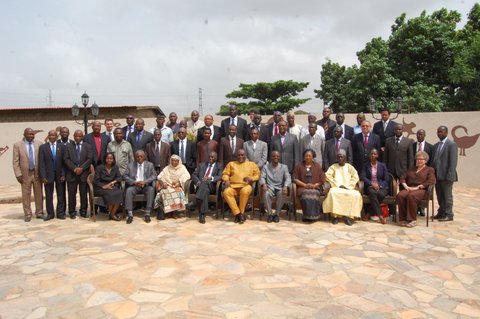Minister urges rethink of policy strategies for sustainable economic development of West Africa
| Ghana’s Minister of Trade and Industry, Honourable Ekwow Spio-Garbrah has called for a rethink of policy strategies and programmes to fast-track industrialization of West Africa based on innovative, pragmatic and effective ways to spur sustainable economic growth and development of the region.
“The establishment of an appropriate industry-related policy; institutional and regulatory frameworks, at both national and regional levels, are vital to our development. We need as a sub-region, to harmonize common standards for our industrial/manufactured products,” the Minister said in Accra, on Monday 20th April, 2015, while opening a regional experts meeting on the validation of strategy for the implementation of the West Africa Common Industrial Policy (WAPIC 2015-2020). Underscoring the need to meet international standards and norms as a key element of global competitiveness, the minister said a “situation where each Member State has its own standard do not foster trade and integration among members.” While commending as a step forward towards regional integration, the ongoing process of convergence between UEMOA and ECOWAS through the projected operationalization of the ECOWAS Common External Tariff (CET), Minister Spio-Garbrah, said West Africa “must do away with artificial barriers that inhibit smooth movement of goods and services across the borders.” He urged the experts to come up with recommendations that “will shape the development process being vigorously pursued in our sub-region,” and also bearing in mind the Economic Partnership Agreement (EPA) between West Africa and the European Union, and “the challenge it presents to our manufacturers.” The Commissioner explained that in the revision of the implementation strategy for consideration and validation by the experts and ministers due to meet in the Ghanaian capital 24-25 April, has taken into account the need to consolidate the industrial space of the region through strengthening of the national industrial base and industrial cooperation by Member States, improved access to market opportunities, competitiveness, choice of sectoral priorities and mobilization of resources and all relevant actors/stakeholders. He listed the key goals of WACIP in the next 15 years to include doubling of raw material processing at the local level, tripling the contributions of manufacturing industry to the Gross Domestic Product (GDP), quadrupling intra-community trade and raising the export volume of manufactured products. These include the European Union for financing phases 1, 2 and 3 of the West African Quality Programme to the tune of 28 million-Euro; the technical support from United Nation Industrial and Development Organization (UNIDO), the German Government through GTZ, the Helen Keller International Organization, and the World Bank. The expected outcomes of the experts and ministerial meetings include validation of the Revised Strategy for Industrial Development (2015-2020); an ECOWAS Industrial Database and Information System framework; Support for the implementation of the third-phase of the West Africa Quality Programme; Validation for adoption of the ECOWAS Harmonized Standards (ECOSTAN) and support of development partners in the area of agro-industry value chains and construction industrial. Participants are from ECOWAS Member States, National industry experts, ECOWAS Standard Harmonization Technical Monitoring Committee Bureau, representatives of National Manufacturers Associations, Chambers of Commerce and Industry, technical and financial partners, including European Union Bank, United Nations Industrial Development Organization (UNIDO), United Nations Economic Commission for Africa (UNECA), and LR Group from Israel, among others. Directorate of Communications |




